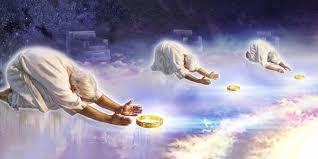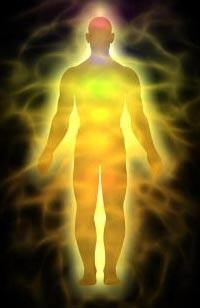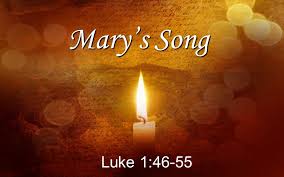Bc – For We Must All Appear Before the Bema of Messiah 5: 9-10
For We Must All Appear Before the Bema of Messiah
5: 9-10
For we must all appear before the bema of Messiah DIG: Will you make pleasing ADONAI the goal of your life? Believers are never judged. How do these verses confirm that truth? What is the bema? Who is it that appears before the bema of Messiah? On what basis are the crowns rewarded? When does this take place? Who is the Judge?
REFLECT: The bema of Messiah will be a place of eternal reward for faithful believers. What kind of reward(s) should you expect? Every believer receives at least one crown. Which crown(s) could you possibly receive? What purpose do these crowns serve? What are you doing with the gifts God has already given you? What will He say to you at the bema?
Believers will receive crowns for works done in the Body of Messiah after salvation.
With remarkable clarity Paul gives us a basic chronology of what happens the moment we die. Here’s how it works. First, while we are at home in our earthly bodies (our temporary tents), we are absent from the Lord (5:6). Sure, we can talk to Him in prayer, but we cannot see Him, we cannot visit Him, we cannot cry on His shoulder or sit at His feet and learn from Him. But, secondly, the moment we fold our tents, when the moment of death comes, when we lay our bodies down and are absent from our bodies, we will immediately be transported into the presence of Yeshua. Then Paul said: We are confident, then, and would much prefer to leave our home (in our earthly bodies) and come to our home in heaven to be with the Lord (5:8).137
Therefore, whether at home on earth or away from home in heaven (to see link click Bb – Going Home), regardless of our location, we try our utmost to please Him (5:9). ADONAI is looking for people like Noah in the twenty-first century – people willing to live for the pleasure of God, not the pleasure of this world. For the eyes of ADONAI move here and there throughout the whole earth, to show Himself strong on behalf of those who are wholehearted toward Him (Second Chronicles 16:9). From heaven ADONAI observes people to see if anyone has understanding, to see if anyone seeks after Him (Psalm 14:2). Are you one of them? Your wisest moments will be those when you say “Yes!” to God.138
For all believers must all appear before the bema of Messiah, that each one may receive what is due them for the things done while in the Body, whether good or bad (5:10). This is a place of reward in heaven after the Rapture of the Church. In the synagogue, the bema is the raised platform where the Word of God is read and the service is conducted. It is a place of honor and blessing. There is no fear at the bema. For believers, this should not be confused with the judgment of unbelievers (see the commentary on Revelation Fo – The Great White Throne Judgment). There is no fear at the bema. John spoke of the bema when he wrote: In this way, love is made complete among us so that we will have confidence on the day of judgment, because in this world we are like Him. There is no fear in love. But perfect love drives out fear, because fear has to do with punishment. The one who fears is not made perfect in love (First John 4:17-18).
The basis of blessing at the bema will be the believer’s works done in the Body of Messiah after salvation. This is illustrated in the parable of the Bags of Gold. Some were faithful and were rewarded, and some were not and lost their reward (see my commentary on The Life of Christ Jx – The Parable of the Bags of Gold) The believer’s sins will not be judged, because they have already been forgiven at the cross, and there is no condemnation for those who are in Messiah Yeshua (Romans 8:1). It will not be a question of the believer’s sins, but a matter of reward to determine degree of authority in the Millennial Kingdom.
What will we do with our crowns when we receive them? John tells us that believers will lay their crowns before the throne in heaven and proclaim: You are worthy, our Lord and God, to receive glory and honor and power, for You created all things, and by Your will they were created and have their being (Rev 4:10b-11).
Paul gives us a more detailed passage dealing with the bema. By the grace God has given me, I laid a foundation as an expert builder, and someone else is building on it. But each one should be careful how he builds. For no one can lay any foundation other than the one already laid, which is Yeshua the Messiah. Paul again explains that the basis for judgment is the works of the believer. The foundation is Yeshua Messiah. In addition, their works will not be based on quantity, but quality instead. If any man builds on this foundation using gold, silver, costly stones, wood, hay or straw, his work will be shown for what it is, because the Day will bring it to light. The question will not be how much gold, silver and costly stones or wood, hay or straw, but was it gold, silver and costly stones or was it wood, hay and straw? Thus, some believers will find their works burned up, while others will merely find them refined. It will be revealed with fire, and the fire will test the quality of each man’s work. Forgiveness does not exclude accountability. It’s just burning away the dross to purify the real stuff that is to be rewarded. Finally, the rewards are given. Those who have built with gold, silver and costly stones will find their works still remaining, but purified after the fire has been applied. If what he has built survives, he will receive his reward (First Corinthians 3:10-14).
Dear Heavenly Father, Praise You for Your wonderful love! Praise You that not only do You totally forgive the sins of those who love and fear You (Psalms 103:11-12), You also reward Your children. You are so wise to see each person’s heart attitude. People evaluate a deed by how much it accomplishes, but you God look into the heart. Thank You for looking into the heart of each person so that when you give a reward, Your reward is totally fair because it is based not on outward appearance but on their heart attitude. For man looks at the outward appearance, but ADONAI looks into the heart (First Samuel 16:7c). You are wonderful and it is a joy to serve You in good times and in hard times. We bend the knee to you and seek to bless you with all our thoughts and actions. In Yeshua’s holy name and power of resurrection. Amen
But if they have built with wood, hay and straw, they will be burned up. Therefore, he will suffer loss, in the sense of lost rewards and authority in the Millennium, nothing more. Lest anyone think that he lost his salvation, Paul says in no uncertain terms that he himself will be saved. His works do not determine salvation. Since we can do no works to earn our salvation, we can do no works to lose our salvation. His eternal relationship with the Lord is guaranteed because God has anointed us, set His seal of ownership on us, and put His Spirit in our hearts as a deposit, guaranteeing what is to come (1:21-22). Salvation equals faith . . . plus nothing. But he will spend a thousand years in the Messianic Kingdom as one escaping through the flames with nothing to show for his spiritual life (First Corinthians 3:15).

This passage says nothing about the nature of the reward; however, other passages do. They speak of these rewards as being crowns. The Greek language has two words meaning crown. The first word is diadem, which is a king’s crown. It is the crown of sovereignty and of a person who is royal by his nature and by his position – a king. This is the kind of crown that Yeshua wears. The second Greek word is stephanos, which is a crown given to an overcomer, a victor, one who has won a race. These are the kinds of crowns available to believers because they overcame in the spiritual warfare with Satan and are now crowned at the bema of Messiah. There are five such crowns mentioned in the Bible.139
The first is called the incorruptible crown: Do you not know that in a race all the runners run, but only one gets the prize? Run in such a way as to get the prize. Everyone who competes in the games goes into strict training. They do it to get a crown that will not last; but we do it to get a crown that will last forever (First Corinthians 9:24-25). This crown is given to believers who faithfully run the race, believers who crucify their selfish desires in the flesh and point people to Messiah. God calls some people to do things that will require some sacrifice in the way they live and conduct their lives. This verse also implies that these people will receive this crown for the sacrifices they were willing to make for ADONAI in order to successfully complete the call or mission God called them to do. They were faithful to that call.
The second crown is called the crown of rejoicing: For what is our hope, our joy, our crown of rejoicing? Is it not even you in the presence of our Lord Yeshua Messiah at His Second Coming? For you are our glory and joy (First Thessalonians 2:19-20). Paul asked rhetorically, what would be the greatest blessing he could possibly receive at the bema of Messiah. The Thessalonians were! They were everything that was worth anything to Messiah. They were His hope, crown, glory and joy. In essence, Paul said, “When life is over and we stand in the presence of our Lord Yeshua at His Second Coming, you Thessalonians will be His source of glory and joy, you mean that much to Him.” This is the soul winner’s crown. It is not hard to understand God’s eagerness to reward those who bring the lost to Him. Some have the gift of evangelism, but we are all to evangelize. We need to understand that a relationship with Yeshua is exactly what unbelievers are searching for, whether they realize it or not, and reaching out to them causes God to rejoice.
The third crown is the crown of righteousness: Now there is in store for me the crown of righteousness, which the Lord, the righteous Judge, will award to me on that day – and not only to me, but also to all who have longed for His appearing (Second Timothy 4:7-8). Rabbi Sha’ul had stored up spiritual currency in heaven, and so can we. Yeshua Himself said: Store up for yourselves treasures in heaven, where moth and rust do not destroy, and where thieves do not break in and steal it (Matthew 6:20). Yeshua tells us that there isn’t anything that you have suffered in this life that will not be rewarded at least a hundred times as much (Mark 10:29-30). This crown of righteousness describes itself. It is the crown of eternal righteousness – the very righteousness of the Redeemer granted in full perfection to the glorified believer. When we receive our glorified bodies, we will receive this crown. All believers will be rewarded.
The fourth crown is called the crown of life: In James, it is a crown for those people who remain faithful to the gospel even under persecution: Blessed is the man who perseveres under trial, because when he has stood the test, he will receive the crown of life that God has promised to those who love Him (James 1:12). And in the book of Revelation, it is given to those who suffer martyrdom for their faith. Do not be afraid of what you are about to suffer. I tell you, the devil will put some of you in prison to test you, and you will suffer persecution for ten days. Be faithful, even to the point of death, and I will give you the crown of life. He who has an ear to hear, let him hear what the Spirit says to the churches. He who overcomes will not be hurt at all by the second death (Revelation 2:10-11).
The fifth and final crown mentioned in the Bible is the crown of glory: To the elders among you, I appeal as a fellow elder, a witness of Messiah’s sufferings and one who also will share in the glory to be revealed. There are glorious days coming when those who serve Yeshua with the right heart and in the right way will be rewarded. Be shepherds of God’s flock that is under your care, serving as overseers – not because you must, but because you are willing, as God wants you to be; not greedy for money, but eager to serve; not lording it over those entrusted to you, but being examples to the flock. And then Peter makes an application: When the Shepherd appears, you will receive the crown of glory that will never fade away (First Peter 5:2-4). This is a crown for faithfully feeding the flock of ADONAI. It is available to those pastors, messianic rabbis, elders and other teachers who feed the sheep with the milk and meat of the Word of God.
There may be other crowns available, but these are the only ones referred to in the Bible. At least these five are available to those whose works remain, which are built of gold, silver and precious stones. These crowns are for the purpose of determining the degree of authority in the Messianic Kingdom and not for the Eternal State. In eternity, all believers will be equal, but not so in the Millennial Kingdom where believers will have different positions of authority (Luke 19:11-27).140





 மிகுந்த மகிழ்ச்சியுடன், மகிழ்ச்சி அலை மேரியின் இதயத்தை நிரப்பியிருக்க வேண்டும். கடவுளின் சித்தத்தில் தன் பங்கைப் பற்றி அந்த இளம்பெண் இனி யோசிக்கவில்லை, எலிசபெத் அதை உறுதிப்படுத்தினாள். அவள் தன் உறவினரான எலிஷேவாவின் முன் நின்றபோது, அநேகமாக கைகளை நீட்டி, கண்களை மூடிக்கொண்டு கண்ணீரோடு வழிந்தாள், பரிசுத்த ஆவியால் நிரப்பப்பட்ட அவள் தன்னிச்சையாக தன் பாடலைப் பாடினாள். கி.பி 400 இல் லத்தீன் மொழியில் ஜெரோம் மொழிபெயர்த்த வல்கேட் பகுதியின் முதல் வார்த்தையிலிருந்து இந்த வசனங்கள் மேக்னிஃபிகண்ட் என்று மேற்கத்திய உலகில் அறியப்படுகின்றன. லூக்கா, இங்கே 1:46-66 இல் மேரி, 1:68-79 இல் சகரியா, 2:14 இல் தேவதூதர்களின் பாடகர், மற்றும் 2:29-32 இல் சிமியோன்.
மிகுந்த மகிழ்ச்சியுடன், மகிழ்ச்சி அலை மேரியின் இதயத்தை நிரப்பியிருக்க வேண்டும். கடவுளின் சித்தத்தில் தன் பங்கைப் பற்றி அந்த இளம்பெண் இனி யோசிக்கவில்லை, எலிசபெத் அதை உறுதிப்படுத்தினாள். அவள் தன் உறவினரான எலிஷேவாவின் முன் நின்றபோது, அநேகமாக கைகளை நீட்டி, கண்களை மூடிக்கொண்டு கண்ணீரோடு வழிந்தாள், பரிசுத்த ஆவியால் நிரப்பப்பட்ட அவள் தன்னிச்சையாக தன் பாடலைப் பாடினாள். கி.பி 400 இல் லத்தீன் மொழியில் ஜெரோம் மொழிபெயர்த்த வல்கேட் பகுதியின் முதல் வார்த்தையிலிருந்து இந்த வசனங்கள் மேக்னிஃபிகண்ட் என்று மேற்கத்திய உலகில் அறியப்படுகின்றன. லூக்கா, இங்கே 1:46-66 இல் மேரி, 1:68-79 இல் சகரியா, 2:14 இல் தேவதூதர்களின் பாடகர், மற்றும் 2:29-32 இல் சிமியோன். மிரியம் பாதையில் வந்தபோது, எலிஷேவா வாசலில் நின்று கொண்டிருந்தார். அவள் வருகையை எதிர்பார்த்தது போல் இருந்தது. மேரியின் குரலுக்கு எலிசபெத்தின் உடனடி பதில், தேவதூதன் தன்னிடம் சொன்ன அனைத்தையும் அந்த வயதான பெண்ணுக்கு உடனடியாக உறுதிப்படுத்தியது. எலிசேவா மிரியமின் வாழ்த்துக்களைக் கேட்டபோது, திடீரென்று குழந்தை அவள் வயிற்றில் குதித்தது, எலிசபெத் பரிசுத்த ஆவியால் நிரப்பப்பட்டாள் (லூக்கா 1:41). கருக்கலைப்புக்கு எதிரான மற்றொரு நல்ல வசனம் இது. தாயின் வயிற்றில் இருப்பது வேதத்தில் ஒரு நபராகக் கருதப்படுகிறது. யோவான் உன்னதமானவரின் தீர்க்கதரிசியாக இருப்பார் (லூக்கா 1:76), இயேசு உன்னதமானவரின் குமாரன் (லூக்கா 1:32). ஒரு மலட்டுப் பெண்ணுக்கு ஜான் பிறந்தது உண்மையிலேயே அதிசயமானது என்றாலும், யேசுவா ஒரு கன்னிப் பெண்ணுக்குப் பிறந்தது முன்னோடியில்லாதது.63
மிரியம் பாதையில் வந்தபோது, எலிஷேவா வாசலில் நின்று கொண்டிருந்தார். அவள் வருகையை எதிர்பார்த்தது போல் இருந்தது. மேரியின் குரலுக்கு எலிசபெத்தின் உடனடி பதில், தேவதூதன் தன்னிடம் சொன்ன அனைத்தையும் அந்த வயதான பெண்ணுக்கு உடனடியாக உறுதிப்படுத்தியது. எலிசேவா மிரியமின் வாழ்த்துக்களைக் கேட்டபோது, திடீரென்று குழந்தை அவள் வயிற்றில் குதித்தது, எலிசபெத் பரிசுத்த ஆவியால் நிரப்பப்பட்டாள் (லூக்கா 1:41). கருக்கலைப்புக்கு எதிரான மற்றொரு நல்ல வசனம் இது. தாயின் வயிற்றில் இருப்பது வேதத்தில் ஒரு நபராகக் கருதப்படுகிறது. யோவான் உன்னதமானவரின் தீர்க்கதரிசியாக இருப்பார் (லூக்கா 1:76), இயேசு உன்னதமானவரின் குமாரன் (லூக்கா 1:32). ஒரு மலட்டுப் பெண்ணுக்கு ஜான் பிறந்தது உண்மையிலேயே அதிசயமானது என்றாலும், யேசுவா ஒரு கன்னிப் பெண்ணுக்குப் பிறந்தது முன்னோடியில்லாதது.63